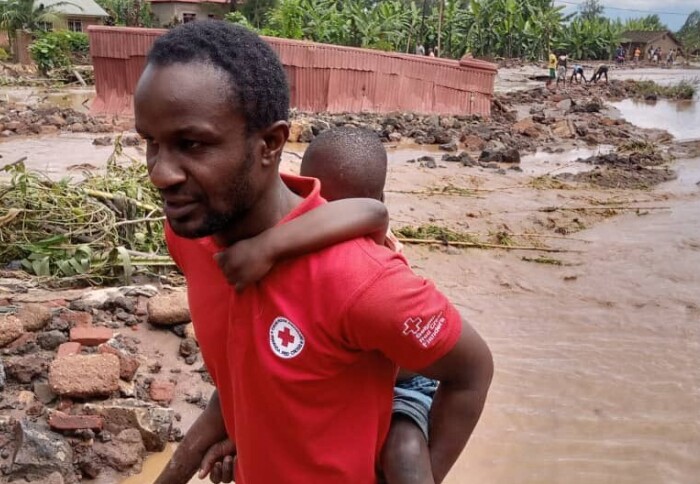Climate science urgently needed to prepare for extreme weather in central Africa

A Red Cross worker evacuates a child from floodwaters in Rwanda. Image by Red Cross Rwanda.
Climate scientists are calling for urgent investment in climate science and adaptation in central Africa to prepare for changing weather extremes.
In a new study published today, World Weather Attribution (WWA) researchers say an absence of long-term weather data and poor climate model performance meant they could not find out how climate change contributed to the recent devastating flooding in Rwanda and the Democratic Republic of Congo (DRC).
In early May, heavy rainfall led to flooding and hundreds of landslides around Lake Kivu on the border between Rwanda and the DRC.
Nearly 600 people died, with 135 fatalities reported in Rwanda and 460 reported in the DRC.
Rainfall is becoming heavier in many regions of the world because a warmer atmosphere can hold more moisture and the Intergovernmental Panel on Climate Change (IPCC) is expecting an increase in heavy rainfall in central Africa in the coming decades.
However, using their signature ‘rapid attribution’ methods, WWA scientists were not able to determine how climate change influenced the flooding.

Joyce Kimutai, researcher at the Grantham Institute for Climate Change and the Environment, Imperial College London and one of the authors of the study, says climate models struggle to accurately simulate heavy rainfall in most regions of Africa and especially in central Africa.
“Poor model performance was one factor that prevented us from completing an attribution analysis on the Lake Kivu extreme rainfall that led to the floods.
“Increased investment in climate science and weather observations will help improve the performance of climate models in central Africa, which will help communities and governments anticipate and adapt to changing weather extremes.”
The study found that in Rwanda and the DRC, conflict has led to the destruction of weather stations, historic paper-based observational records need digitising and meteorological agencies need proper funding to enable them to share their data more freely.

Of WWA’s more than 50 studies to date, this study was one of just three to have inconclusive results. The other two were also focused on countries in Africa – the 2015 Ethiopia and 2022 Central Sahel droughts, where similar data issues prevented a conclusive finding on the role of climate change.
Dr Friederike Otto, co-founder of WWA and Senior Lecturer in climate science at Imperial College London says today’s study is reflective of a wider lack of climate research Africa.
“The African continent has contributed the least to global greenhouse gas emissions but suffers severe losses and damages due to the impacts of climate change hitting vulnerable populations. Many of these losses are poorly understood.”
“Unless fossil fuels are rapidly phased out, heavy downpours will continue to become more severe around the world, including in many regions of Africa.”
The Lake Kivu region is one of the world’s most densely populated regions. It is also home to important mineral reserves critical for the global transition to replace fossil fuels with renewable energies.
The DRC produces around 74% of cobalt worldwide, a key component in rechargeable batteries used in electric vehicles.
The WWA study notes that while these cobalt reserves “places the DRC at the centre of the decarbonization transition,” mining operations can lead to deforestation and water degradation, making communities more vulnerable to climate hazards, like flooding.
Article supporters
Article text (excluding photos or graphics) © Imperial College London.
Photos and graphics subject to third party copyright used with permission or © Imperial College London.
Reporter
Sam Ezra Fraser-Baxter
The Grantham Institute for Climate Change